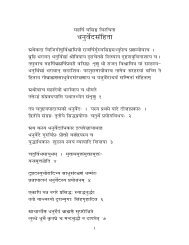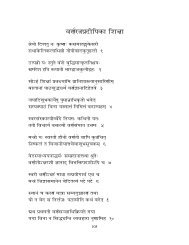You also want an ePaper? Increase the reach of your titles
YUMPU automatically turns print PDFs into web optimized ePapers that Google loves.
3.68. A householder has five slaughter-houses (as it were, viz.) the hearth, the grinding-stone, the broom, the<br />
pestle and mortar, the water-vessel, by using which he is bound (with the fetters of sin).<br />
WDVD ‘PH> VYD5VD LQ N‰7\Z PKL 5L ! S .„{»D PKD\`D! ¾7\K JKPHL[QDP<br />
3.69. In order to successively expiate (the offences committed by means) of all these (five) the great sages have<br />
prescribed for householders the daily (performance of the five) great sacrifices.<br />
$;\DSQ ÂÚ\`! LSW\`V WX WS5>P KDHPDH G(YDH ELOU{ D(WDH Q\`DH $LWLZS8MQP<br />
3.70. Teaching (and studying) is the sacrifice (offered) to Brahman, the (offerings of water and food called)<br />
Tarpana the sacrifice to the manes, the burnt oblation the sacrifice offered to the gods, the Bali offering that<br />
offered to the Bhutas, and the hospitable reception of guests the offering to men.<br />
S #WDQ \DH PKD\`DQ Q KDS\LW ]L‹W! V JKH $LS YVQ LQ7\ V8QDGDH (U{ Q LO3\WH<br />
3.71. He who neglects not these five great sacrifices, while he is able (to perform them), is not tainted by the<br />
sins (committed) in the five places of slaughter, though he constantly lives in the (order of) house (-holders).<br />
GHYWD $LWLZ 7\DQD LSW†>DP $D7PQ] F \! Q LQY5SLW S DQDP ›YVQ Q V M,YLW<br />
3.72. But he who does not feed these five, the gods, his guests, those whom he is bound to maintain, the manes,<br />
and himself, lives not, though he breathes.<br />
$ÕW F ÕW F #Y WZD ¾ÕWP #Y F ÂDÚ ÕW ¾DL]W F S \`DQ ¾F@WH<br />
3.73. They call (these) five sacrifices also, Ahuta, Huta, Prahuta, Brahmya-huta, and Prasita.<br />
MSDH $ÕWDH ÕWDH KDHP! ¾ÕWDH D(LWNDH ELO! ÂDÚ ÕW L´MD€ DFD5 ¾DL]W LSWWS5>P<br />
3.74. Ahuta (not offered in the fire) is the muttering (of Vedic texts), Huta the burnt oblation (offered to the<br />
gods), Prahuta (offered by scattering it on the ground) the Bali offering given to the Bhutas, Brahmya-huta<br />
(offered in the digestive fire of Brahmanas), the respectful reception of Brahmana (guests), and Prasita (eaten)<br />
the (daily oblation to the manes, called) Tarpana.<br />
6YD;\D\H LQ7\\X‹! 6\DG{ G(YH F #Y K NP5L> G(YNP5L> \X‹DH LK LE LW5 G FU $FUP<br />
3.75. Let (every man) in this (second order, at least) daily apply himself to the private recitation of the Veda,<br />
and also to the performance of the offering to the gods; for he who is diligent in the performance of sacrifices,<br />
supports both the movable and the immovable creation.<br />
$”D( ¾D6WD $ÕLW! V0\J $DLG7\P SLWÑWH $DLG7\DM MD\WH YL WU{ Y WHU{ $¸ WW! ¾MD!<br />
3.76. An oblation duly thrown into the fire, reaches the sun; from the sun comes rain, from rain food, therefrom<br />
the living creatures (derive their subsistence).<br />
\ZD YD\X VPDLÍ7\ YW51WH VY5M1WY! WZD JK6ZP $DLÍ7\ YW51WH VY5 $DÍPD!<br />
3.77. As all living creatures subsist by receiving support from air, even so (the members of) all orders subsist by<br />
receiving support from the householder.


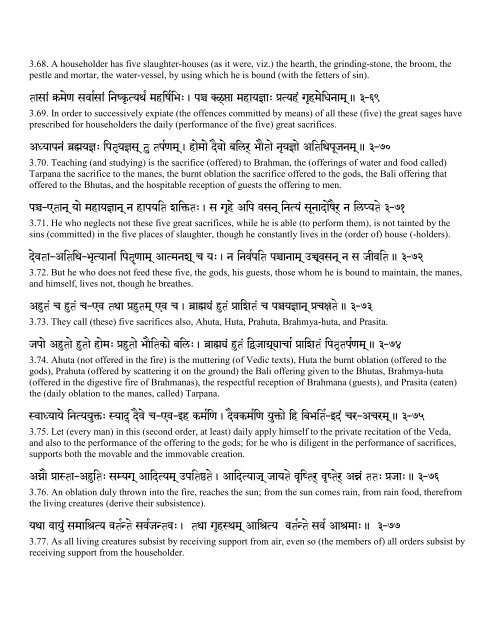
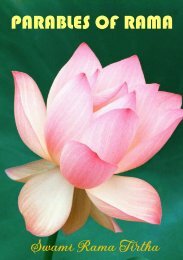
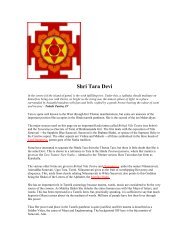
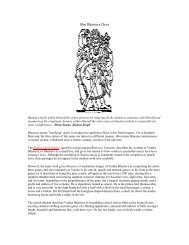
![[ Home ] [ Up ] Books Contact us Immortal Promise ... - Hindu Online](https://img.yumpu.com/9577792/1/190x245/-home-up-books-contact-us-immortal-promise-hindu-online.jpg?quality=85)
